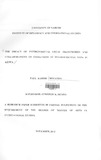| dc.description.abstract | The environment is one of the issues that are today widely debated in various forums around the world. This is because of its importance in national and global socio-economic developmeat. This has come about on the realization of the central role good environmental conditions play in the well-being of mankind on this planet both in the present and for posterity. The state of the environment has a heavy bearing on economic and social status of human populations. The destruction of the environment in various parts of the globe is posing serious challenges on livelihoods and lifestyles of people that reside in those areas. Biological diversity is not spared either as the populations of many of them become diminished or even extinct.
The increasing awareness of the significance of environment has led to the emergence of many actors whose objectives are to promote sound environmental conservation methods as well as address factors that lead to degradation of the environment. One group of these actors is the Environmental Non-Governmental Organizations (ENGOs). Over the years, ENGOs have grown in numbers and influence and currently playa crucial role in the efforts to enhance the conservation of the environment world over. They engage in diverse sectors of the environment and interact with a wide range of other actors in making sure the conservation of the environment is undertaken in a more aggressive way.
In Kenya the environmental NGOs have been around since independence and their numbers have increased steadily over the years. Currently the presence of ENGOs is visible in various parts of this country and they engage on their own and also collaborate with other players in activities geared to promote conservation of the environment. The crucial role of the environment in the lives of mankind inspired interest and choice of this
field study. This study sets out to find out how environmental NGOs have fared in their environmental conservation objectives and endeavors and what factors 'have affected their performance. With this in mind, the study analyses the collaboration between ENGOs and the government in environmental conservation, and the environmental legal frameworks in Kenya.
The core of the study is the analysis of the impacts these collaborations and environmental legal frameworks have had on operations of NGOs in the field of environmental conservation in Kenya. One of the findings of the study is that the environmental legal frameworks currently obtained in Kenya are adequate for effective conservation of the environment. The study has concluded that the major impediment to environmental conservation in the country has been the failure to adequately implement exiting environmental laws. Some of the factors behind the poor implementation of environmental laws in Kenya are the weaknesses in institutional capacities of governmental institutions mandated to enforce laws, lack of political will and inadequate funding of government institutions that conserve environment and biodiversity.
The study concludes that shoddy and inadequate implementation of environmental legal frameworks by governmental agencies concerned have undermined the operations of ENGOs in the country. The study has also established that the current levels of collaborations between environmental NGOs and government in Kenya are not adequate for efficient and effective promotion of environmental conservation. Weak linkages and lack of transparency are some of the factors cited for undermining effective collaboration of environmental NGOs and governmental institutions in the country.
The data for the study was obtained through both secondary and primary sources of data collection. The secondary data came from both published and unpublished documents, while the primary data was gathered through both interactive interviews and structured questionnaires. One of the recommendations of this study is that the government should improve and strengthen the capacity of the governmental institutions mandated to implement and enforce environmental legal frameworks such as through the increment in their funding and staffing levels. | en_US |

